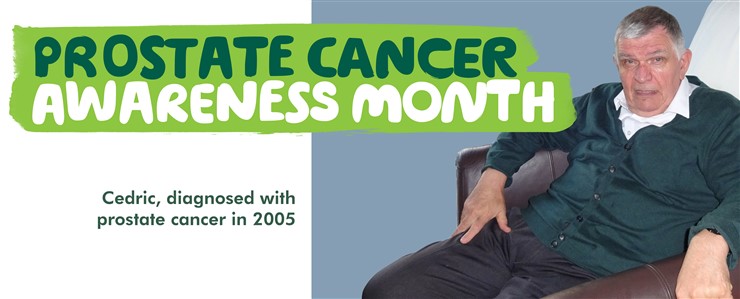
This is the second blog for Prostate Cancer Awareness Month written by a Macmillan volunteer reviewer. Today’s blog is written by Cedric. He writes about the difficulties caused by the late effects of radiotherapy for prostate cancer, and how he is still able to lead an active life and give back.
My name is Cedric. I live in Greater Manchester. I was diagnosed with prostate cancer in 2005 when aged 53. Following five years of PSA tests and other monitoring and a research study, I had radiotherapy.
When I began treatment, I specifically asked to have it at the Christie Hospital. I found the Macmillan nurse particularly helpful in preparing me for the immediate side effects of the radiotherapy. After my treatment, I was discharged to my GP practice and I continue to have PSA tests every six months or so.
This blog focuses on late side effects of the radiotherapy, which I began to experience only after I had been discharged to my GP. Having been discharged as a cancer patient, I had difficulty in being referred to the appropriate consultant for the side effects. I found the Macmillan leaflet Managing the late effects of pelvic radiotherapy in men and took it with me to my consultant appointment with my symptoms marked. It helped for me to identify what side effects I had, in order to get some help.
The side effects relate to my bowel and urinary functions. Frequency and urge to urinate were a particular problem when I was still at work. Now that I am retired and at home most of the time as my wife’s main carer, the problem is still there, but I can visit the toilet more or less whenever I want.
The bowel side effects started later. I am a now a patient of a bowel consultant with appointments every six months or so. A number of treatments have been tried. I still frequently wake up several times a night with an urgent need for a bowel movement. This affects my sleep pattern, making me very tired during the day. This can make caring for my wife difficult. Currently, my treatment consists of tablets which I can take up to five times a day. I take two or three a day spaced out during daytime and evening. This helps with my bowel movements.
Despite the late effects of my treatment, I am able to care for my wife and volunteer for Macmillan. Because of the support I had from Macmillan during my diagnosis, treatment and subsequent late side effects, I wanted to help with Macmillan’s work to support others. I do this with donations, reviewing draft publications and attending local groups - such as Manchester Cancer.
Over 10 years on from diagnosis and treatment, I am very grateful for the treatments that do enable me to live an active life and contribute in some way to Macmillan.
To see what else Macmillan's cancer information team has been blogging about, please visit our blog home page! You can subscribe to receive our blogs by email or RSS too.
We're with you every step of the way
The Macmillan team is here to help. Our cancer support specialists can answer your questions, offer support, or simply listen if you need a chat. Call us free on 0808 808 00 00.
Comments? Feel free to add them below (you need to be logged in).
Keep in touch Follow Macmillan’s cancer information team on Twitter @mac_cancerinfo
Whatever cancer throws your way, we’re right there with you.
We’re here to provide physical, financial and emotional support.
© Macmillan Cancer Support 2026 © Macmillan Cancer Support, registered charity in England and Wales (261017), Scotland (SC039907) and the Isle of Man (604). Also operating in Northern Ireland. A company limited by guarantee, registered in England and Wales company number 2400969. Isle of Man company number 4694F. Registered office: 3rd Floor, Bronze Building, The Forge, 105 Sumner Street, London, SE1 9HZ. VAT no: 668265007